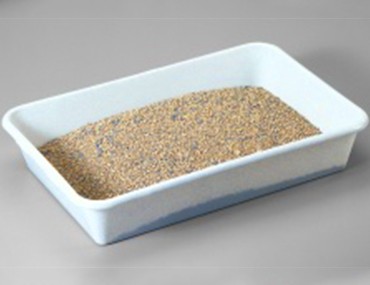
Who knew there was so much to kitty litter? Dr. Justine Lee provides some valuable litter box advice. For more from Dr. Lee, find her on Facebook!
Last week, we talked about adding the appropriate number of litter boxes to your house. Well, just because you added n+1 litter boxes doesn’t mean you can clean less frequently! We neurotic types clean litter boxes daily. If that’s too much for you, litter boxes should be scooped out at least every other day. Of course, this depends on how many cats you have. The more cats you have, the more frequently the boxes should be scooped out. While it’s a dirty job, it really should be done for the best interest of your cat(s).
If you notice your cat scratching outside the litter box instead of inside (“What’s a cat gotta do to get you to clean the litter box? Helllllo!”), it’s his way of telling you that the litter box is disgusting and he doesn’t want to get his feet filthy while he’s “attempting” to cover up his poop inside. If you just cleaned the litter box and he’s still doing it, it’s likely from a bad memory of getting soaked or dirty while in the box, so unless you want a pet that poops in random places, get in there and scoop.
Some cats will “hold it” and urinate as infrequently as possible to avoid stepping into a dirty, filthy, full litter box. Instead of urinating two to three times a day, your cat will tighten up and only go once a day. This makes his urine get more concentrated and could make crystals and urine debris plug up and cause him to get a life-threatening feline urethral obstruction (FUO). With FUO, cats may have stones, crystals, or mucous plugs in their urethra that prevent them from being able to urinate. Not only is this painful, but it can also lead to temporary kidney failure, electrolyte abnormalities, vomiting, lethargy, cardiac arrhythmias, and death. So to help prevent problems like this or even diseases like feline lower urinary tract disease or sterile cystitis (e.g., feline urinary tract disease or FLUTD), scoop!
The other added benefit of scooping frequently is that it helps you detect medical problems earlier. If your cat isn’t urinating, you’ll notice when there’s no urine in the litter box for two days. If your cat becomes a diabetic, he may be making larger and larger clumps and your whole litter box will be one huge clump after its weekly cleaning. But you’ll never be able to tell this if you’re not scooping enough. If your cat is acting constipated or having diarrhea, you won’t find out until days later, and by then it’ll be a bigger (and more expensive) medical treatment! As tedious as it is, please do your wife a favor and flush, and your cat a favor and scoop.
So, how do you scoop? I realize that sounds like a stupid question, but I’m often shocked how people are erroneously “scooping.” Some clients tell me they dump out the whole litter box (and all that clumping litter) every week. Yikes – no need folks! You and your cat’s carbon footprints are contributing to the overfilled landfills and making Al Gore very angry. Not only is this expensive, but it’s really wasteful. If you really want to know, I only completely empty and bleach out the litter box a few times year or so.
My tip? Use clumping litter if you’re not sure what your cat prefers, since studies have shown that cats prefer this type of litter the best. (More on “Clay, clumping, and crystal kitty litter: Which should I choose?” next week!). Next, keep an empty container (e.g., a 5 pound bucket that used to contain kitty litter), line it with a plastic bag, and use a scoop to scoop out the urine clumps and feces every day. Dump the clumps directly into the empty container, and voila: you just have to dump the plastic bag once a week. It makes it oh so easy to scoop, contains the smell in the empty bucket, and saves a few plastic bags while making it more convenient to scoop. As the kitty litter box becomes emptier, just add in clean clumping kitty litter. No need to dump out precious, expensive, eco-unfriendly full boxes when cleaning – just scoop out the dirty and add in clean.
I’ll elaborate on this more in next week’s blog on “Clay, clumping, or crystals.”
Hate cleaning your box? Have any tips this dirty job?
If you have any questions or concerns, you should always visit or call your veterinarian – they are your best resource to ensure the health and well-being of your pets.
